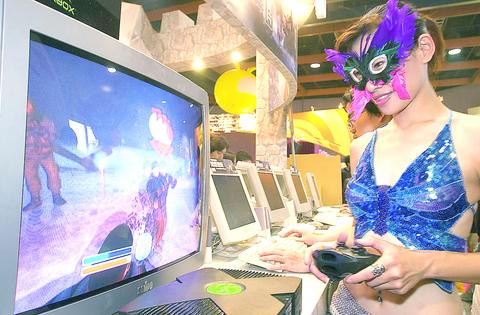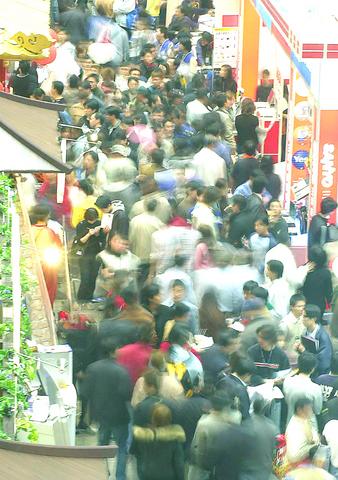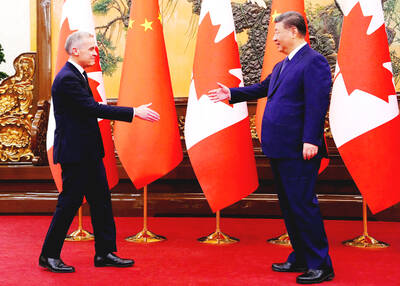The annual Taipei Game Show and Taipei Computer Entertainment & Multimedia Show (
Organized by the Taipei Computer Association (TCA,

PHOTO: SEAN CHAO, TAIPEI TIMES
"There were about 550,000 visitors last year with the average age being somewhere in the range of 20 to 40 years old," explained TCA's Shaun Chow (

PHOTO: SEAN CHAO, TAIPEI TIMES
In all a total of 150 companies will be displaying their wares in more than 1,100 booths for the duration of the four-day show, much of which is interactive and gives visitors the chance to kill or be killed, total a high-end sports car or simply design and clothe a showgirl.
Leading local PC game companies such as Gamania -- developers of the Chinese version of Sony's popular adventure game, EverQuest -- have taken the unprecedented step of erecting 64 booths, each one of which will be equipped with half-a-dozen or so gaming systems on which visitors can attempt to set new high scores.
Although it will not be operating as many booths as Gamania, Unalis -- the company charged with converting War Craft III into Chinese -- will also be on hand and promoting the recently released Chinese version of the real-time action adventure game. Like those of all the companies present at the event, the Unalis booth has plenty of paddles and monitors on which visitors can do battle with savage, green-skinned Orcs.
In keeping with the laws of the land, gambling games will not feature at the exhibition. Players will, however, be able to win non-cash prizes at the numerous booths offering games of mahjong.
With the emphasis on localized games, it's hoped that the number of such games will increase and include ones that allow Taiwan's gamers the chance to control their favorite homegrown sporting heros.
One company that has benefited from this strategy and is present at this year's show is Maxxis, which has seen its localized versions of Speed Mania prove to be a huge hit with Taiwanese gamers.
Sports games that have not been adapted to the local scene have proved more difficult to market in Taiwan.
Cutting-edge games which now allow the player to control everything from David Beckham's hairstyle to Kobe Jones' on-court dribbling prowess -- while extremely popular throughout Europe and the US -- remains unpopular in Taiwan.
According to Chou, however, the recent decision to combine the nation's two baseball leagues could be the perfect opportunity for a local developer to introduce Taiwan's first indigenous sporting computer game.
"The success of the localized version of Speed Mania, which allows the user to drive on Taiwan's roads and see familiar scenery, has meant that we'll probably see a lot more localized games in the near future," continued Chou. "I reckon the new combined baseball league is the perfect starting block for such localization. I mean, what better way is there to promote it than with its own game?"
It's not solely the appetites for destruction, high-speed car chases and long-forgotten mythical lands of the PC gamer that are being catered for at the international trade center this weekend. While disagreements over funding has meant Sony's PS2 will be notably absent from the show, representatives of Microsoft's gaming console, Xbox are on hand.
Microsoft will be throwing down the gauntlet and handing out the paddles to anyone who reckons they can set high scores on popular XBOX games that include Project Gotham, Mech-Assault and Extreme Beach Volleyball.
With the change in format of this year's show already proving popular, organizers have expressed hopes that show will someday rival in terms of importance the behemoth Tokyo Game Show and Los Angeles's E3, both of which attract game manufacturers from around the world.
"It's the first year we've had a game show per se, so it's a bit early to say whether or not it's a success," stated Chou. "But we certainly hope that next year's event will see even more international and local game manufacturers sharing floor-space at the [Taipei World Trade Center's] exhibition hall."
The Taipei Game and Computer Entertainment & Multimedia Show runs through Monday, Feb. 24 from 9am and 5pm at Taipei's World Trade Center, Hall 1. Admission is NT$200.

On a harsh winter afternoon last month, 2,000 protesters marched and chanted slogans such as “CCP out” and “Korea for Koreans” in Seoul’s popular Gangnam District. Participants — mostly students — wore caps printed with the Chinese characters for “exterminate communism” (滅共) and held banners reading “Heaven will destroy the Chinese Communist Party” (天滅中共). During the march, Park Jun-young, the leader of the protest organizer “Free University,” a conservative youth movement, who was on a hunger strike, collapsed after delivering a speech in sub-zero temperatures and was later hospitalized. Several protesters shaved their heads at the end of the demonstration. A

Google unveiled an artificial intelligence tool Wednesday that its scientists said would help unravel the mysteries of the human genome — and could one day lead to new treatments for diseases. The deep learning model AlphaGenome was hailed by outside researchers as a “breakthrough” that would let scientists study and even simulate the roots of difficult-to-treat genetic diseases. While the first complete map of the human genome in 2003 “gave us the book of life, reading it remained a challenge,” Pushmeet Kohli, vice president of research at Google DeepMind, told journalists. “We have the text,” he said, which is a sequence of

In August of 1949 American journalist Darrell Berrigan toured occupied Formosa and on Aug. 13 published “Should We Grab Formosa?” in the Saturday Evening Post. Berrigan, cataloguing the numerous horrors of corruption and looting the occupying Republic of China (ROC) was inflicting on the locals, advocated outright annexation of Taiwan by the US. He contended the islanders would welcome that. Berrigan also observed that the islanders were planning another revolt, and wrote of their “island nationalism.” The US position on Taiwan was well known there, and islanders, he said, had told him of US official statements that Taiwan had not

Britain’s Keir Starmer is the latest Western leader to thaw trade ties with China in a shift analysts say is driven by US tariff pressure and unease over US President Donald Trump’s volatile policy playbook. The prime minister’s Beijing visit this week to promote “pragmatic” co-operation comes on the heels of advances from the leaders of Canada, Ireland, France and Finland. Most were making the trip for the first time in years to refresh their partnership with the world’s second-largest economy. “There is a veritable race among European heads of government to meet with (Chinese leader) Xi Jinping (習近平),” said Hosuk Lee-Makiyama, director